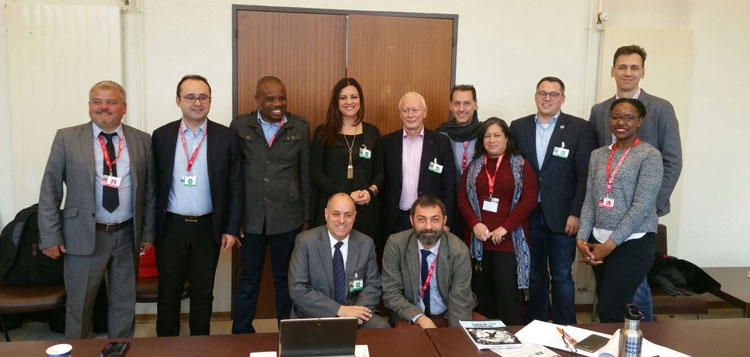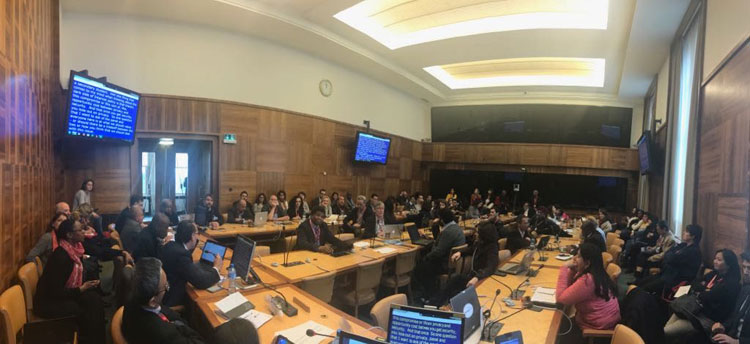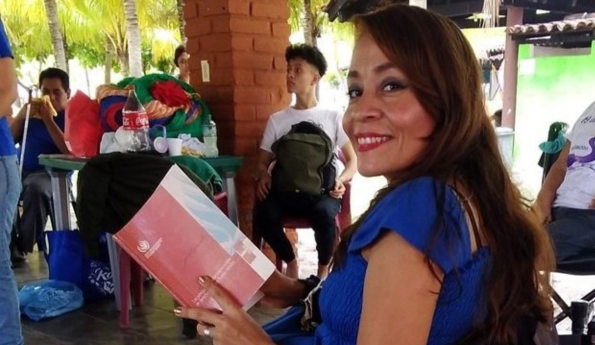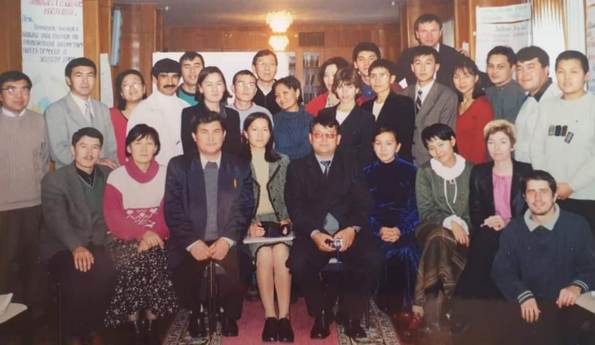By: Dominic Bellone, Senior Program Officer
Who governs the internet? What government sets the rules for a platform with no traditional state borders or formal governing structure? What are the social and political implications of internet usage? How can the internet serve as a platform to protect civic space as democracy and human rights continue to decline globally and online?
These issues and many others were addressed at the 12th Annual Internet Governance Forum (IGF) in Geneva, a United Nations-sponsored event that brought together 2,000 attendees from 143 countries. This diverse group of stakeholders from government, civil society, academia, private sector, and the technical community came together to analyze, discuss, and build consensus around these and many other challenging and urgent questions.
Connecting Civil Society Activists with Policy-Makers
Counterpart International hosted a delegation of six civil society activists representing media, legal and gender rights communities from Sri Lanka, Ukraine, Venezuela, and Zimbabwe. Supported by Counterpart’s Internet Governance and Internet Freedom program (IG/IF), the delegation amplified the voice of civil society in global internet governance policy discussions.

Members of the European Parliament meet with Counterpart delegates at the Internet Governance Forum in Geneva.
As part of this conversation, more than a dozen bilateral meetings were hosted with leaders from government (including Canada, the US, and Sweden, in addition to members of the European parliamentary delegation), multilateral institutions, other international NGOs, as well public policy officers from Microsoft, Twitter, Facebook and Google. Major topics discussed included data protection and security, the handling of content takedown requests from government (i.e. what happens when a social media company is asked to remove content a government deems illegal), and the phenomena of fake news and disinformation. To inform this conversation, legal officials from the Council of Europe shared with us their latest report, Information Disorder: Toward an interdisciplinary framework for research and policymaking (PDF), which smartly defined three types of information disorder: mis-information, dis-information, and mal-information.
“The bilateral meetings were a win-win for everyone involved, as our delegates had a rare opportunity to showcase their amazing work to top international tech and government officials while in turn the government and tech representatives got to hear from frontline human rights advocates who are impacted and have the most at stake in the debate,” said Danilo Bakovic, Counterpart’s Chief of Party for Internet Governance/Internet Freedom program.
Adding to the impact of these meetings, the Counterpart delegation’s presentation, “The Dark Side of Internet Policy: How Flawed Policy Can Lead to Censorship, Surveillances, and Shutdowns” was selected among hundreds of other proposed topics to be part of the official IGF meeting. Their message? Fundamental online rights to expression and access to information are under threat as governments target dissident activists and investigative journalists, and curtail healthy public discourse through legislation, surveillance, disinformation and manipulation of online spaces. While universal internet access has hastened the spread of democracy and human rights around the world, authoritarian governments have just as effectively used technology and the internet to suppress rights and the voices of their opponents.

Counterpart’s Delegation presents “The Dark Side of Internet Policy” at the Internet Governance Forum.
Activists Share Their Stories
Counterpart’s panel workshop provided a forum where our delegates shared their most compelling stories. Our delegate from Zimbabwe, Earnest Mudzengi, spoke of concerns with pending computer crimes legislation and a pessimistic outlook for protecting the rights of end users in light of that country’s recent military assisted transition. Of the current internet governance policies in Zimbabwe, Mr. Mudzengi said, “You have policies that are imposed from above, policies that lack citizen input, and these policies are centered around the politicians. They are mainly there to protect the interests of politicians and that’s the tragedy we’re having in Zimbabwe.”
In Ukraine, where a “hybrid war” involving both traditional arms and cyberwarfare exists with Russia, public policy discussions around internet governance have become heavily monitored with an aim to neutralize Russian propaganda through the blocking of popular social media and mail services – often without consideration of the right to expression, political dissent, and people’s right to an open and uncensored internet.
In Sri Lanka, our gender specialist highlighted the sexual harassment online of girls and women, revenge porn, and online stalking, which often have terrible real-world consequences. “One of the dominant narratives [we are challenging] is that this kind of violence is not widespread, and that it’s just an urban issue. And there is this false dichotomy of online and offline, whereas we see a lot of the time, this kind of binary is not there,” said Sachini Perera, an independent researcher and activist on gender and tech. Another delegate from Sri Lanka emphasized a creeping “cyber nanny” state with the introduction of hate speech codes meant to curtail libel, defamation and other extremist or hateful speech, but which may be used to censor legitimate political speech.
Venezuela has a similar phenomenon concerning a recently passed hate speech code, and deliberate attempts by the government to use it against its critics. “There is no need for this law, we don’t have a history of hate crime in Venezuela…. The law is very ill-defined. It doesn’t define anywhere what hate speech is, and is pretty much focused on expressions against government officers,” said delegate Iria Puyosa, a media researcher from Venezuela.
Pursuing a Free, Open, and Safe Internet
The internet is essential to a healthy, functioning democracy in which everyone has a voice and a space to express oneself publicly, to associate and organize with others, and to seek and impart information across boundaries. The internet can provide the level playing field for the broader civil society community (e.g. the media, academia, human rights activists, policy specialists, etc.) to fully participate in public policy discussions. Counterpart believes it is vitally important to support grassroots actors and organizations struggling at the state level to advocate for a free, open, and safe internet for all. We will continue to amplify their voices at international policy forums where vital discussions are taking place to address what’s at stake when internet freedom is restricted and eliminated.




